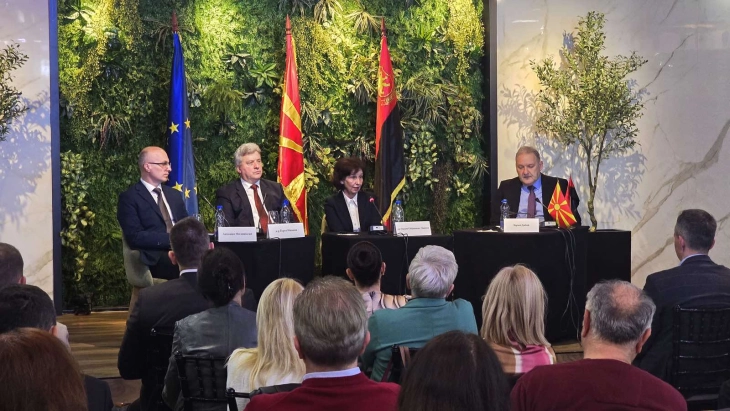Last night, the city committee of VMRO-DPMNE Skopje organized an open forum on Macedonia’s engagement in international relations, the restoration of diplomatic integrity, and the protection of Macedonian national interests in the global political landscape, entitled “MACEDONIA: Dignity on the World Stage.”
Professor Dr. Gordana Siljanovska Davkova criticized the dysfunctionality of current diplomacy, citing miscommunication between the President, the Minister of Foreign Affairs, and the Parliament. She emphasized the need to refocus on multilateral diplomacy and advocating for national interests through international organizations and institutions while respecting European law and relevant documents concerning minority and human rights. Additionally, she suggested considering the principle of reciprocity in future diplomatic relations as a fundamental national priority.
Presidential candidate of VMRO-DPMNE, Siljanovska Davkova, underscored the imperative of restoring the effectiveness of Macedonian diplomacy, primarily by bolstering systems for evaluating diplomats’ performance, promoting their careers based on merit and demonstrated diplomatic abilities, and assigning diplomatic postings abroad accordingly. Drawing from his experience, former President Dr. Gjorge Ivanov stressed the importance of restoring the disrupted balance between legislative, executive, and judicial authorities. He noted that the executive branch had encroached upon the powers of the Assembly, the President, and the judiciary, relegating them to mere government service roles. This imbalance, he argued, had led to numerous unprofessional, erroneous, and low-quality decisions, incurring significant costs for the country. Ivanov asserted that reinstating the equilibrium of powers among these branches would be crucial for coordinated governance and success both domestically and internationally.
President of the Foreign Policy Commission in the Parliament and former Minister of Foreign Affairs, Antonio Miloshoski, highlighted current deficiencies in the Ministry of Foreign Affairs, which he claimed had escalated significantly over the past seven years. In addition to alleging numerous legal violations by Minister Osmani, Miloshoski pointed out procedural irregularities in the appointment of ambassadors, partisan staffing practices, and the exclusion of highly capable diplomatic personnel from decision-making processes. He characterized Osmani’s Cabinet as a “tea kitchen” run by a select few, making decisions independent of the MFA’s established structure. Miloshoski announced plans for an audit and the recall of ambassadors sent abroad illegally.
The forum attracted significant interest from the professional community, with a large turnout of current and former diplomats and parliamentarians.





Comments are closed for this post.